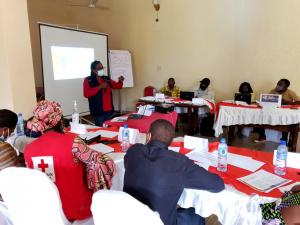WHO, UNFPA, UNICEF host training on prevention of sexual exploitation and abuse in the Democratic Republic of the Congo
When an Ebola outbreak was declared in their town on 8 October this year, the residents of Beni, in the eastern part of the Democratic Republic of Congo, needed reinforcements – not only against the risk of contracting the disease itself, but also against the risk of sexual exploitation and abuse at a particularly vulnerable moment.
To reduce the latter risk, WHO, UNICEF and UNFPA jointly organized prevention of sexual exploitation and abuse training for focal points at agencies, international and non-government organizations working on the front lines of the Ebola response. Held in Beni on 20 October 2021, the training was a direct response to the findings of the Independent Commission on Allegations of Sexual Exploitation and Abuse during the Response to the 10th Ebola Outbreak in DRC, released last month.
“The training is part of the strategy to prevent acts of sexual exploitation and abuse,” noted Dr. Islande Georges Cadet, WHO Prevention of Sexual Exploitation and Abuse Coordinator in North Kivu, who led the training. “For us, these are immediate actions that will ensure that all humanitarian actors intervening in the response to the Ebola resurgence can understand and respect the fundamental principles of human rights towards the affected population.”
“There was insufficient information shared with the local population on sexual exploitation and abuse during the 10th, 11th and 12th Ebola outbreaks,” she added. “The local community has the right to be informed about the risks of sexual exploitation and abuse, so that every child and adult can have access to safe, accessible and effective reporting mechanisms.”
For Enyo Gbedemah, coordination team member and UNICEF child protection specialist for Maniema and South Kivu provinces, the training was critical to protecting vulnerable populations against incidences of sexual abuse.
“We need to strengthen the internal capacities of all organizations involved in the response, and to ensure that everyone is informed of the zero-tolerance policy to sexual exploitation and abuse – what to do and what not to do,” said Gbedemah. “Placing survivors at the heart of our concerns is essential. We must strengthen mechanisms for reporting sexual exploitation and abuse so that fewer cases go undisclosed."
The initial cohort of 24 trainees was equipped to address reports of sexual abuse that arise during health interventions in their respective communities, to reinforce the zero-tolerance policy against perpetrators, and to ensure that survivors of sexual exploitation and abuse are offered support.
That support includes medical care, psychosocial support, legal and judicial support, and socioeconomic reintegration after assessing the needs of survivors.
The trainees are now expected to organize briefing sessions on prevention of sexual exploitation and abuse for their respective organizations, and to make themselves available to support other organizations or agencies during prevention of sexual exploitation and abuse training sessions in Beni.
Trainee Esther Vira Kavughe, of the Beni-based Collective of Farmers in Defence of Human Rights came away with a clear mandate for raising awareness.
“We have a key message to spread in our communities: to refuse any job offered in exchange for sex, especially in our regions already ravaged by armed conflict and poverty,” she said.
Further training sessions are planned for the next few weeks in Beni, and will focus on community liaisons and action cells, religious leaders, and youth associations.
UNFPA’s Christelle Nziavake, Prevention of Sexual Exploitation and Abuse Coordinator based in Ituri province, noted that the training drew on existing strategies for responding to gender-based violence.
“These trainings are part of an holistic, victim-centred approach to intervention,” she said.
Communications Officer
WHO DRC
Tel : +243 81 715 1697
Office : +47 241 39 027
Email: kabambie [at] who.int (kabambie[at]who[dot]int)
Communications and marketing officer
Tel: + 242 06 520 65 65 (WhatsApp)
Email: boakyeagyemangc [at] who.int (boakyeagyemangc[at]who[dot]int)



